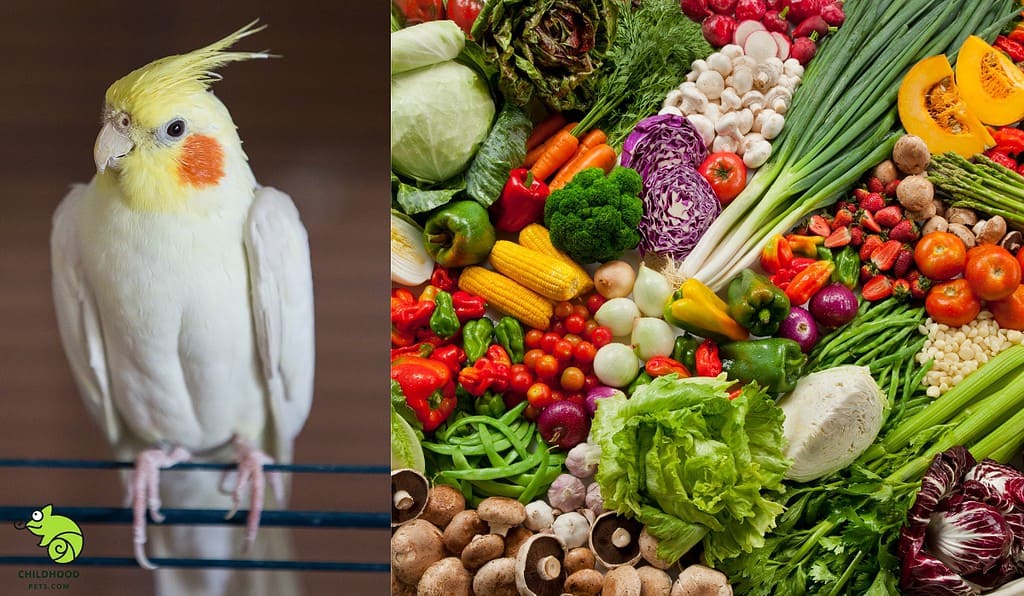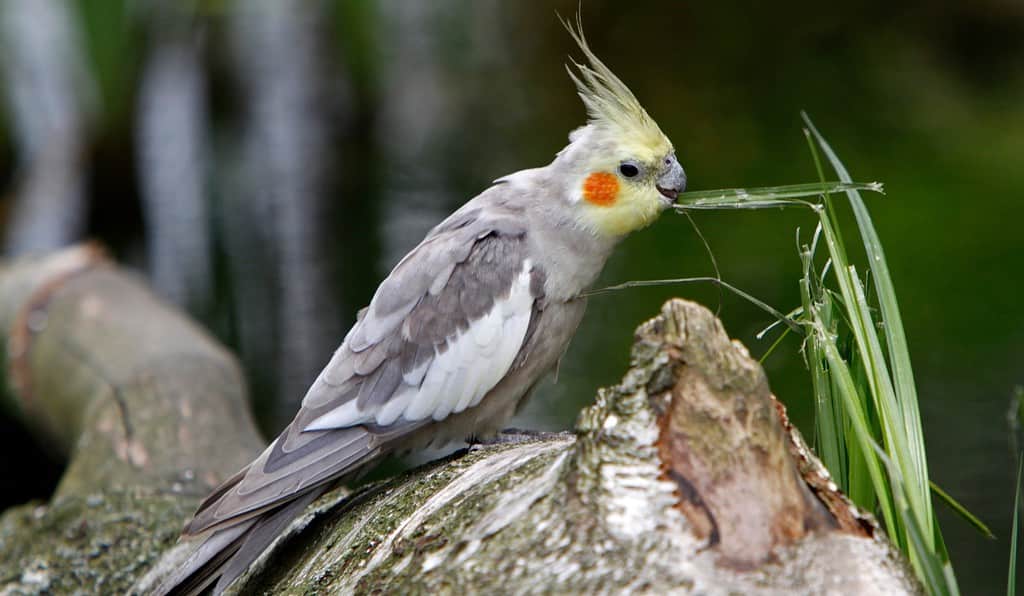
Did you know that in the wild, cockatiels feast on a variety of seeds, fruits, berries, and vegetation, often foraging near the ground? Their natural diet is a testament to their love for veggies, but how does this translate to our domesticated friends?
As a general rule, cockatiels can consume a mix of vegetables daily, but it should only make up about 20-25% of their total diet. Certain veggies offer immense benefits, while others should be limited or avoided to ensure their well-being.
Curious about which veggies get the green light and which ones to steer clear of? Dive in as we unravel the mysteries of a cockatiel’s veggie diet, backed by expert vet insights and comprehensive research. Trust me; you’ll be surprised at what you discover!
🍎 Did You Know? Cockatiels in the wild have a diverse diet, often foraging near the ground for their favorite treats.
The Importance of Vegetables in a Cockatiel’s Diet
Cockatiels, like us, benefit immensely from a varied diet. Vegetables, packed with essential nutrients, play a pivotal role in ensuring our feathered pals are at their healthiest. Not only do they provide a burst of vitamins and minerals, but they also contribute to a balanced diet that keeps cockatiels chirping happily.
🥦 Tip: A varied diet with a mix of seeds, fruits, and vegetables ensures your cockatiel remains healthy and chirpy!
From my extensive research and experience, here are the top 5 nutrients found in vegetables that are a boon for cockatiels:
- Vitamin A: Crucial for maintaining healthy skin, feathers, and vision.
- Calcium: Essential for strong bones and beak, and plays a role in nerve function.
- Fiber: Aids in digestion and ensures a healthy gut.
- Antioxidants: Helps combat oxidative stress and boosts overall immunity.
- Phytonutrients: These are beneficial compounds that promote optimal health and ward off diseases.
Now, while veggies are fantastic, the question remains: is it safe for cockatiels to munch on them every day? Let’s explore.
Daily Vegetable Consumption: Is It Safe?
Before we delve into the pros and cons, it’s essential to understand that moderation is key. Just as you wouldn’t eat only broccoli for weeks on end (tempting as it might be), variety is crucial for our avian buddies.
Pros of Daily Vegetable Intake
1. Nutrient Boost: Vegetables are powerhouses of essential vitamins and minerals that ensure your cockatiel is in peak health.
2. Hydration: Some veggies are water-rich, providing an additional hydration source. Speaking of which, here are the top 3 vegetables ranked by their hydration content:
- Cucumber: Over 95% water content, it’s like a mini oasis for your bird.
- Lettuce: Apart from being crunchy, it’s also a great way to quench thirst.
- Zucchini: Not only hydrating but also packed with nutrients.
3. Mental Stimulation and Foraging Behavior: Introducing new veggies can be an exciting adventure for cockatiels, stimulating their natural foraging instincts.
Potential Concerns
- Over-reliance on a Single Type of Vegetable: Just as we need variety in our diets, so do cockatiels. Feeding them only carrots, for instance, won’t cut it.
- Risk of Overfeeding and Obesity: Yes, even birds can overeat. It’s essential to monitor portion sizes.
- Possible Exposure to Pesticides: Always ensure the veggies are thoroughly washed. Organic is best, but if that’s not feasible, a good rinse can remove most surface residues.
Now that we’ve covered the basics, in the next sections, we’ll delve deeper into which vegetables are safe for daily consumption, how to serve them, and those to limit or avoid. Stay tuned, fellow bird enthusiasts!
Safe Vegetables for Daily Consumption
Alright, let’s get to the juicy part – which vegetables are safe for our feathered friends to munch on daily? From my years of experience and research, I’ve found that a variety of veggies can be both nutritious and delightful for cockatiels.
| Type | Vegetable | Description | Serving Tip |
| Leafy Greens | Spinach | A powerhouse of nutrients. Rich in vitamins and minerals. Best consumed in moderation. | Lightly steam and chop into small pieces. Ensure it’s cool before serving. |
| Lettuce (Romaine) | Hydrating and low-calorie. Light and crunchy. | Wash thoroughly and tear into manageable pieces. Avoid iceberg variety. | |
| Kale | A superfood rich in vitamins and antioxidants. | Offer raw or lightly steamed. Chop into bite-sized pieces. | |
| Crunchy Veggies | Carrots | Great source of beta-carotene. Beneficial for vision. | Offer raw, finely grated, or in thin slices. If cooked, ensure they’re soft but not mushy. |
| Broccoli | Rich in fiber and other essential nutrients. A favorite among many cockatiels. | Offer raw or lightly steamed. Ensure it’s washed thoroughly. | |
| Bell Pepper | Colorful, crunchy, and rich in vitamin C. | Remove seeds, wash thoroughly, and chop into small pieces. Offer different colors. | |
| Others | Cucumber | Hydrating, especially during summer. Low in calories. | Slice thinly or offer in small chunks. Ensure it’s washed well. |
| Corn on the cob | Source of entertainment and nutrition. | Offer cooked or raw. If cooked, ensure it’s cooled down and not seasoned. | |
| Peas | Protein-packed tiny green gems. | Offer fresh and raw or thawed if frozen. Ensure they’re at room temperature. |
🌽 Insight: Introducing a variety of vegetables not only ensures a balanced diet but also keeps your cockatiel mentally stimulated and curious about their food.
How to Prepare a Mixed Vegetable Salad for Cockatiels:
- Choose Fresh Veggies: Opt for organic if possible. Ensure they’re fresh and free from any blemishes.
- Wash Thoroughly: This step is crucial to remove any pesticides or contaminants.
- Chop Finely: Cockatiels prefer bite-sized pieces. Ensure they’re small enough to prevent choking but large enough for them to hold and nibble.
- Mix and Match: Combine leafy greens, crunchy veggies, and other vegetables for variety.
- Serve in a Shallow Dish: This allows your cockatiel to see and choose from the variety.
- Monitor Consumption: Remove any uneaten salad after a few hours to prevent spoilage.
Remember, while vegetables are fantastic, always ensure they’re free of pesticides and chemicals. It’s always a good idea to consult with a vet or expert before introducing a new food to your cockatiel’s diet.
Vegetables to Limit or Avoid

While many vegetables are a treat for cockatiels, there are a few that should be given in moderation or avoided altogether. Let’s dive into some of these veggies and understand why they might not be the best choice for our feathered friends.
High Oxalate Vegetables: Spinach and parsley are rich in oxalates. While they offer numerous health benefits, they can cause issues if overfed. Oxalates can bind with calcium and other minerals, leading to potential health concerns. It’s best to feed these in moderation and not as a daily treat.
Potential Toxic Vegetables:
- Onions and Garlic: Both belong to the allium family and can cause digestive issues in cockatiels. They can lead to anemia in birds, so it’s best to keep these away from your pet.
- Avocado: This might be a superfood for us, but for cockatiels, it’s a no-go. Avocado contains a substance called persin, which can be toxic to birds. Even a small amount can lead to severe health complications.
| Vegetable Name | Harmful Component | Side Effects |
| Spinach | High Oxalates | Can bind with calcium leading to health concerns |
| Parsley | High Oxalates | Can bind with calcium leading to health concerns |
| Onions | Thiosulphate | Can cause anemia |
| Garlic | Thiosulphate | Can cause anemia |
| Avocado | Persin | Toxic to birds, can lead to severe health complications |
From my personal experience, I’ve observed cockatiels having varied reactions to different vegetables. While some might relish a particular veggie, others might show signs of discomfort. It’s always essential to monitor your bird after introducing a new food item and consult with a vet if you notice any adverse reactions.
Tips for Introducing Vegetables to Cockatiels
Introducing new foods to your cockatiel can be a fun and enriching experience for both of you. Here are some quick tips to ensure a smooth transition:
- Start Small: Begin with tiny portions to gauge your bird’s reaction.
- Mix with Familiar Foods: Combining new veggies with their regular diet can make the introduction smoother.
- Observe: Watch out for any allergic reactions or digestive issues. If you notice any, it’s best to consult with a vet.
- Fresh is Best: Always ensure the vegetables are fresh and free from pesticides or chemicals.
- Variety is Key: Rotate between different vegetables to provide a balanced diet.
Remember, every cockatiel is unique. What works for one might not work for another. It’s all about understanding your bird’s preferences and ensuring they get a balanced and nutritious diet.
Expert Opinion: What Vets Say
As a veterinarian with years of experience, I’ve had countless discussions with fellow professionals about the dietary needs of cockatiels. Here’s a distilled version of the collective wisdom:
| Recommendation | Reasoning | Frequency |
| Balanced Diet | A diet consisting mainly of seeds is nutritionally incomplete. Cockatiels require a mix of pellets, seeds, fruits, and vegetables. | Daily |
| Pelleted Food | Pellets have been developed to meet all of a bird’s nutritional needs. They should ideally represent approximately 75-80% of the bird’s diet. | Daily |
| Limit High Oxalate Veggies | Vegetables like spinach and parsley are rich in oxalates which can bind with calcium, potentially leading to health concerns. | In moderation |
| Avoid Toxic Foods | Avocado, onions, and garlic can be harmful to cockatiels. | Never |
| Clean Water | Fresh clean water must be available at all times. Dishes should be cleaned thoroughly every day. | Always available |
| No Grit Needed | Cockatiels remove the outer hull of seeds before ingestion, so they don’t require grit for digestion. | Not necessary |
💧 Fact: While cockatiels get hydration from their food, they still need a constant supply of clean water.
Conclusion
Feeding your cockatiel a balanced and varied diet is crucial for its overall health and well-being. While vegetables offer numerous benefits, it’s essential to provide a mix of foods to ensure all nutritional needs are met. Always be cautious about the veggies you introduce, and monitor your bird for any adverse reactions. And remember, when in doubt, always consult with a vet or expert. Your feathered friend relies on you to make the best choices for its diet, and with the right knowledge, you can ensure it leads a happy and healthy life.
Frequently Asked Questions
How much vegetables should a cockatiel eat daily?
A mix of vegetables can be offered daily, but they should only constitute about 20-25% of the total diet.
Are there any vegetables toxic to cockatiels?
Yes, onions, garlic, and avocados are potentially harmful.
How to ensure the vegetables are safe for cockatiels?
Always wash vegetables thoroughly to remove chemicals and pesticides. Opt for organic when possible.
What are the signs of a balanced diet in cockatiels?
A healthy appearance, active behavior, strong feathers, and regular digestion indicate a balanced diet.
